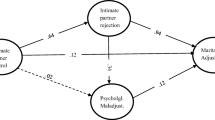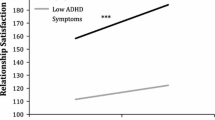Abstract
The purpose of this study was to assess relations between adult intimacy, quality of life, and psychological adjustment. Data were collected in the United States from a sample of 64 college students. The measuring instrumentsused were Personal Information Sheet, Adult version of the Personality Assessment Questionnaire (Adult PAQ), Intimate Partner Acceptance-Rejection/Control Questionnaire (IPAR/CQ), and Life Descriptive Scale (LDS). Results revealed significant positive correlations between intimate adult relationships, the quality of life and psychological adjustment. Results also revealed significant independent influences of intimate adult relationships and the quality of life of the respondents on their psychological adjustment.
Similar content being viewed by others
REFERENCES
Bowlby, J.: 1994, The Making and Breaking of Affectional Bonds (Routledge, New York).
Bretherton, I.: 1995, ‘The origin of attachment theory: John Bowlby and Mary Ainsworth’, in S. Goldberg, J. Kerr and R. Muir (eds.), Attachment Theory: Social, Developmental, and Clinical Perspectives (Analytic Press, Hillsdale, NJ), pp. 45–84.
Bloom, B.L., S.J. Asher and S.W. White: 1978, ‘Marital disruption as a stressor: A review and analysis’, Psychological Bulletin 85, pp. 867–894.
Cassidy, J. and P.R. Shaver (eds.): 1999, Handbook of Attachment: Theory, Research, and Clinical Applications (The Guilford Press, New York).
Descutner, C.J. and M.H. Thelen: 1991, ‘Development and validation of a fear of intimacy scale’, Psychological Assessment 3, pp. 218–225.
Fraley, R.C. and P.R. Shaver: 2000, ‘Adult attachment: Theoretical developments, emerging controversies, and unanswered questions’, Review of General Psychology 4, pp. 132–154.
Goodwin, J.S., W.C. Hurt, C.R. Key and J.M. Sarrett: 1987, ‘The effect of marital status on stage, treatment and survival of cancer patients’, Journal of the American Medical Association 258, pp. 3125–3130.
Greenfield, S. and M. Thelen: 1997, ‘Validation of the fear of intimacy scale with a lesbian and gay male population’, Journal of Social and Personal Relationships 14, pp. 707–716.
Harris, T.O., G.W. Brown and A.T. Bifulco: 1990, ‘Depression and situational helplessness/mastery in a sample selected to study childhood parental loss’, Journal of Affective Disorders 20, pp. 27–41.
Hendrick, C. and S.S. Hendrick (eds.): 2000, Close Relationships: A Sourcebook (Sage Publications, Inc., Thousand Oaks).
Khaleque, A.: 2003, ‘Attachment and lifespan development: A review of the adult attachment literature’, Psychological Studies 48, pp. 28–35.
Khaleque, A. and A. Jahan: 1986, ‘Job satisfaction, mental health and life description of working women’, Indian Journal of Industrial Relations 21, pp. 473–478.
Khaleque, A. and R.P. Rohner: 2002, ‘Reliability of measures assessing the pancultural association between perceived parental acceptance-rejection and psychological adjustment: A meta-analysis of cross-cultural and intra-cultural studies’, Journal of Cross-Cultural Psychology 33, pp. 87–99.
Lynch, J.J.: 1977, The Broken Heart: The Medical Consequences of Loneliness (Basic Books, New York).
Roberts, L. and K.J. Pragner: 1997, Intimacy Diaries and Videotape: Conceptualizing and Measuring Intimacy (Roundtable Presented at the Annual Meeting of the International Network on Personal Relationships, Oxford, OH).
Rohner, R.P.: 1986, The Warmth Dimension: Foundations of Parental Acceptance-Rejection Theory (Sage Publications, Inc., Beverly Hills, CA).
Rohner, R.P.: 1991, Handbook for the Study of Parental Acceptance and Rejection (Center for the Study of Parental Acceptance and Rejection, University of Connecticut at Storrs).
Rohner, R.P.: 2000, Glossary of Significant Concepts in Parental Acceptance-Rejection Theory (on-line at Babylon.com).
Rohner, R.P.: 2001, Bibliography of Writings using Parental Acceptance and Rejection (online at http://vm.uconn.edu/~rohner).
Rohner, R.P and M. Chaki-Sircar: 1988/2000, Women and Children in a Bengali Village (University Press of New England, Hanover, NH).
Rohner, R.P and A. Khaleque: 2003, ‘Relations between partner acceptance and parental acceptance, behavioral control, and psychosocial adjustment among heterosexual adult women’, unpublished manuscript.
Simpson, J.A. and W.S. Rholes: 1998, Attachment Theory and Close Relations (The Guilford Press, New York).
Solano, C.H.: 1986, ‘People without friends: Loneliness and its alternatives’, in V.J. Derlega and B. Winstead (eds.), Friendship and Social Interaction (Springer-Verlag, New York), pp. 225–246.
Thompson, R.A.: 1998, ‘Early sociopersonality development’, in W. Damon (series ed.) and N. Eisenberg (vol. ed.), Handbook of Child Psychology: Social, Emotional, and Personality Development (Wiley, New York), pp. 25–104.
Uchino, B.N., J.T. Cacioppo and J.K. Kielcolt-Glaser: 1996, ‘The relationship between social support and physiological process: A review with emphasis on underlying mechanisms and implications for health’, Psychological Bulletin 119, pp. 488–531.
Wright, J.D.: 1978, ‘Are working women more satisfied? Evidence from several national surveys’, Journal of Marriage and Family 40, pp. 301–313.
Author information
Authors and Affiliations
Rights and permissions
About this article
Cite this article
Khaleque, A. Intimate Adult Relationships, Quality of Life and Psychological Adjusment. Soc Indic Res 69, 351–360 (2004). https://doi.org/10.1007/s11205-004-1543-x
Issue Date:
DOI: https://doi.org/10.1007/s11205-004-1543-x




